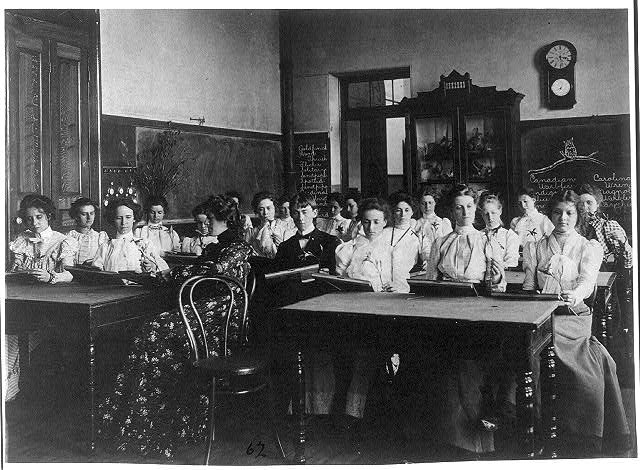
Look at all those enthusiastic students! The above photograph is of a late nineteenth-century classroom. Luckily, the norms of education have changed a lot since then (even if its systemic mechanisms of hierarchy, power, and privilege problematically persist).
Many Hunter College English majors either plan on becoming teachers of English and Language Arts in the K-12 system, or are at least interested in the possibility of teaching as a viable career path. Through my own pedagogical practice of ungrading, which in part asks students to reflect metacognitively on and write about their learning goals, I discovered the extent to which Hunter College English majors taking Survey of American Literature (a required course for all majors) were on a track to becoming teachers themselves. Thus, I thought: If students can engage course content in a way that directly benefits their future career paths, then what better way to do this than inviting them to complete a detailed lesson plan on one of the authors/texts read and discussed over the semester in lieu of a more traditional essay?
Students who complete this project are asked to pick one author they might like to teach in the future and come up with a detailed lesson plan on how they would approach teaching said author to a specific population. Most of the time, this population is hypothetical, though on occasion Hunter College undergraduates are already embedded in teaching roles across New York City.
Let us imagine, for example, that a student is interested in teaching Edgar Allan Poe’s famous poem “The Raven.” In this case, the student should think about how they would go about teaching this poem to middle school students, for instance, in New York City, and maybe even how they would teach it to a specific population within a specific borough or school. How might such a hypothetical population best respond to this text? Students are thus encouraged to think about what they’re teaching, why they’re teaching it, and how they are teaching it, which is an important (and highly practical) exercise in navigating rhetorical genre and audience.
For instance, they might ask themselves as they plan their lesson why a given work is important and what it specifically teaches students. Why is it valuable for students to learn about Poe’s “The Raven” and how can you as a hypothetical teacher make it valuable/meaningful for them? Not only are these questions useful for any prospective teacher, they also reflect student-centered as well as care-centered pedagogies, which we practice in our own classroom culture.
In many cases, this kind of assignment offers Hunter students a chance to envision how they might, through specific teaching plans, enact their own decolonial/anti-racist/care-centered pedagogical practices in the sphere of K-12 education.
Since I am not a K-12 teacher, and since I do not have any experience teaching in this field (though I am certainly very interested in this field!), I look to my students as experts in the formal aspects of this assignment, while nonetheless providing as much feedback as possible from the standpoint of my own teaching experience. I constantly find myself learning from and in awe of my students’ creativity and pedagogical innovations when it comes to how they imagine themselves in the classroom. To complete this project, students are provided with sample lesson plans from previous semesters. In some cases, they ask friends and/or co-workers for guidance and models.

